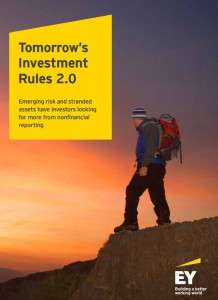
There is clear evidence of a growing reliance on nonfinancial information. Investors, more than ever, are using nonfinancial performance to draw conclusions on value and better inform and underpin their decisions. However, many organizations still fail to meet investor expectations regarding their reporting on environmental, social and economic sustainability performance. For a second year, the EY Climate Change and Sustainability Services (CCaSS) practice surveyed more than 200 institutional investors, including portfolio managers, equity analysts, chief investment officers and managing directors.
EY explored investor views on the availability and quality of corporate nonfinancial information, and on whether investors relied on integrated reporting tools when making investment decisions.
In this report, we analyze the connection between nonfinancial performance and investor behavior. The survey also aims to improve understanding of the role integrated reporting practices can play in highlighting a company’s value creation story.
Emerging investor attitudes revealed
- The percentage of respondents who consider mandatory board oversight of nonfinancial performance reporting “essential” or “important” increased from 36% in 2014 to 80% this year.
- Investors are increasingly enthusiastic about the benefits of integrated reports; with a vast majority indicating they are “essential” or “important” in this year’s study.
- Investors are facing a deficit of the quality and type of nonfinancial information they want. Nearly two-thirds of respondents indicating that issuers are not adequately disclosing environmental, social and governance (ESG) risks.
- Concerns over the potential impacts of stranded assets due to ESG risks are on the rise. The study shows that more than one-third of respondents actually took steps to cut holdings due to stranded asset risk in the past year.
Potential lessons for issuers regarding nonfinancial reporting
Stakeholders are key: Understanding what a business’s key stakeholders believe is important for its future success is fundamental to determining a strategy for nonfinancial reporting.
Materiality matters: Undertaking an assessment to determine what environmental, social and economic sustainability risks and opportunities are most critical to a business’s capacity to create value is important. Investors expect a company to disclose these risks and to explain how it will manage them.
A future worth imagining: As investors seek to understand how well-placed a business is for future growth, the business will need to consider large-scale trends and provide a narrative explaining how its business model is well-placed to succeed in light of them.
Connecting value: With the advent of more integrated reporting, companies should articulate how their specific business models, strategies and governance are connected to financial performance.



